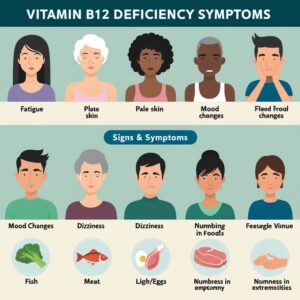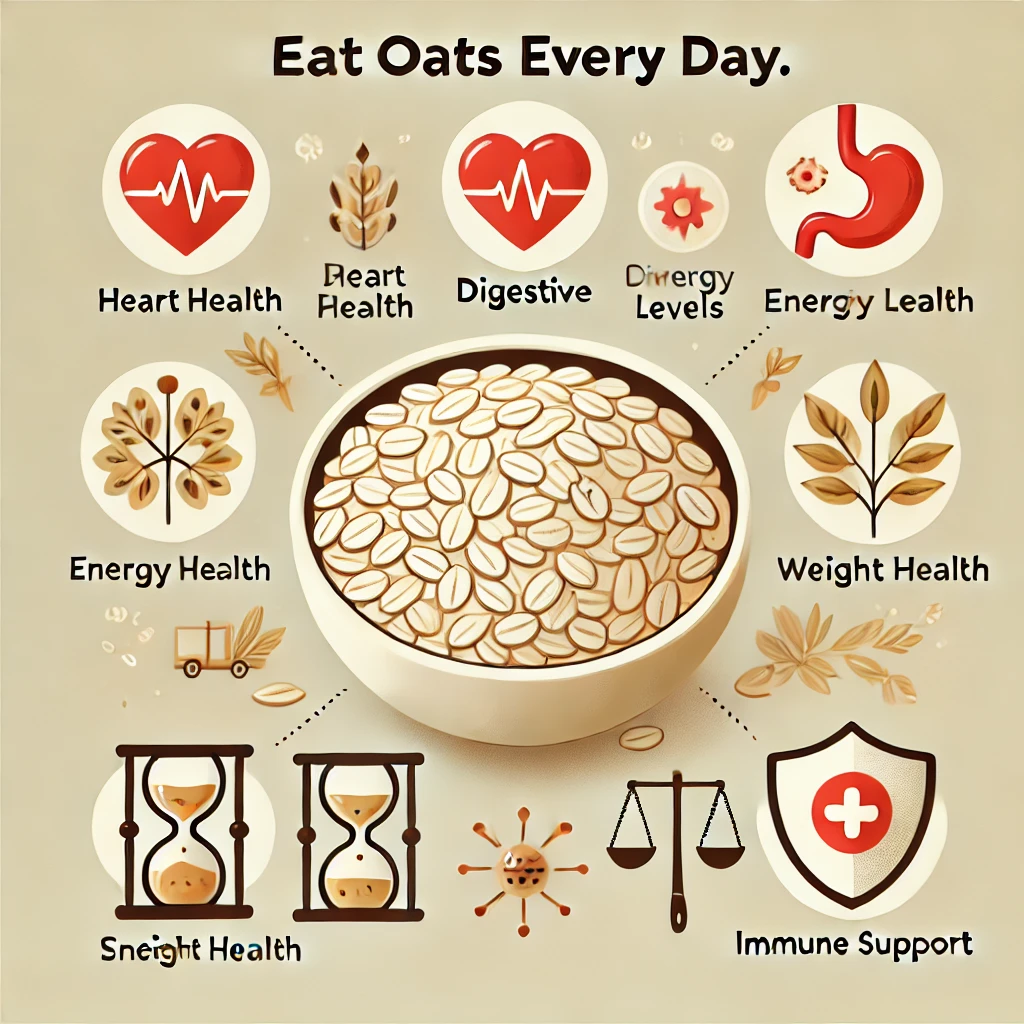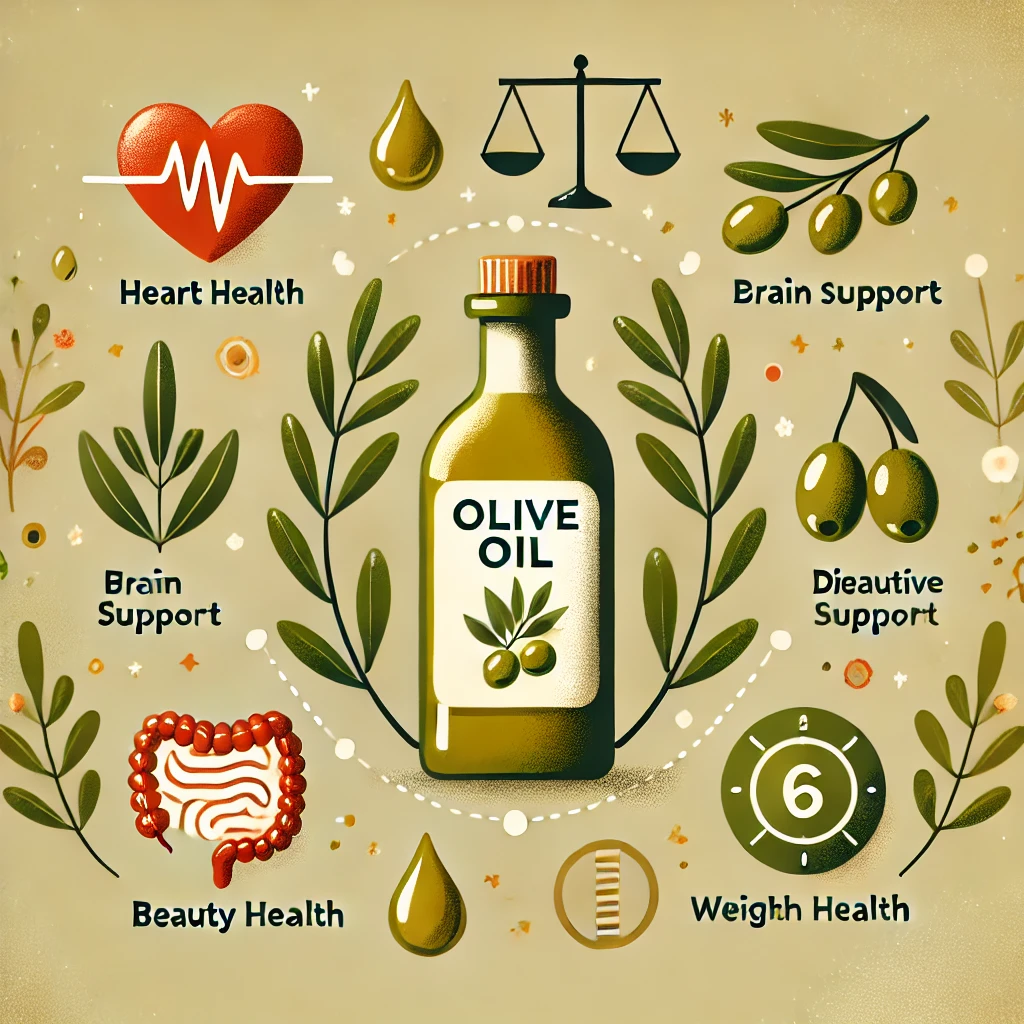Vitamin B12, also known as cobalamin, is an essential nutrient vital for many bodily functions, including red blood cell formation, DNA synthesis, and nerve function. Despite its importance, vitamin B12 deficiency is common and often overlooked. If left untreated, it can lead to severe health complications. In this article, we’ll explore the signs and symptoms of vitamin B12 deficiency, who’s at risk, and why addressing it is crucial for your health.

What is Vitamin B12 and Why is it Important?
Vitamin B12 is a water-soluble vitamin primarily found in animal products, such as meat, fish, and dairy. It’s essential for the following:
- Red Blood Cell Formation: B12 helps produce healthy red blood cells, which carry oxygen throughout the body.
- Nervous System Health: It’s essential for proper nerve function and overall brain health.
- DNA Synthesis: B12 plays a crucial role in creating DNA, the genetic material in our cells.
Our bodies can’t produce vitamin B12, so we must obtain it from diet or supplements. Without enough B12, vital body functions can be compromised, leading to various health issues.
Common Signs and Symptoms of Vitamin B12 Deficiency
If you suspect a deficiency, these are the main symptoms to watch for:
1. Fatigue and Weakness
When the body lacks B12, it can’t produce sufficient red blood cells, which are responsible for transporting oxygen. This often leads to extreme tiredness and muscle weakness, even after a full night’s rest. Feeling tired without any clear reason can be one of the earliest signs of deficiency.
2. Pale or Jaundiced Skin
Vitamin B12 deficiency can cause a pale or slightly yellowish skin tone, known as jaundice. This happens because a lack of B12 impacts red blood cell production, causing the cells to become fragile and break down, releasing bilirubin, a yellow pigment.
3. Tingling and Numbness in Hands and Feet
One of the more alarming symptoms is a sensation of “pins and needles” in the extremities. This symptom occurs because B12 is essential for the health of your nerves, and low levels can damage the protective sheath around them, leading to these sensations.
4. Difficulty Walking and Balance Issues
If left untreated, B12 deficiency can affect movement, causing balance issues, unsteady walking, or even difficulty moving certain muscles. This symptom is particularly noticeable in older adults and can increase the risk of falls and injury.
5. Cognitive Disturbances (Memory Loss, Confusion, Mood Changes)
Vitamin B12 deficiency may also affect cognitive function, leading to memory problems, confusion, and difficulty focusing. In severe cases, deficiency can even mimic symptoms of dementia, especially in older adults.
6. Glossitis and Mouth Sores
Glossitis, an inflamed or swollen tongue, is a common indicator of low B12 levels. It can cause pain, changes in the shape and color of the tongue, and even affect how you speak or eat. Mouth sores and a burning sensation in the mouth are also associated with B12 deficiency.
7. Shortness of Breath and Dizziness
Due to a lack of red blood cells, B12 deficiency can lead to anemia, which may cause shortness of breath, especially during physical activity. You might also experience frequent dizziness, particularly when you stand up quickly.
8. Blurred Vision
Severe deficiency can damage the optic nerve, leading to vision problems. Although rare, this can result in blurred or double vision and light sensitivity, which can improve with proper B12 treatment.
9. Mood Changes, Anxiety, and Depression
Vitamin B12 plays a significant role in brain chemistry and the production of serotonin, which influences mood. Deficiency has been linked to depression, anxiety, and mood swings. Some people experience improvements in mood and mental clarity after increasing their B12 intake.
Who is at Risk of Vitamin B12 Deficiency?
Some individuals are more likely to be deficient in vitamin B12 due to various factors:
- Vegetarians and Vegans: Since B12 is primarily found in animal products, individuals following a plant-based diet may struggle to get enough B12 from food alone.
- Older Adults: As we age, our bodies naturally produce less stomach acid, which is needed to absorb B12 efficiently.
- People with Digestive Disorders: Conditions like Crohn’s disease, celiac disease, or those who’ve had gastrointestinal surgery may have trouble absorbing B12.
- People Taking Certain Medications: Some medications, such as metformin (for diabetes) and proton pump inhibitors (for acid reflux), can interfere with B12 absorption.
If you belong to any of these groups, consider having your B12 levels checked regularly.
How is Vitamin B12 Deficiency Diagnosed?
If you suspect a deficiency, a simple blood test can measure B12 levels. Other tests, like a complete blood count (CBC) or tests for elevated homocysteine and methylmalonic acid (MMA) levels, can also help diagnose deficiency, as these can be elevated when B12 levels are low.
Treatment Options for Vitamin B12 Deficiency
Treating B12 deficiency is straightforward once diagnosed. Here are the most common approaches:
1. Dietary Changes
For those with mild deficiency, increasing intake of B12-rich foods, like meat, fish, eggs, and dairy, may be enough to bring levels back to normal.
2. B12 Supplements
Oral B12 supplements are widely available and often effective, especially for those who struggle to get enough B12 from diet alone. They’re available in pill, tablet, and liquid forms, and the dosage will depend on the severity of the deficiency.
3. B12 Injections
In cases of severe deficiency, injections may be necessary to bypass absorption issues in the gut. B12 injections can provide an immediate boost and are often administered by healthcare professionals.
4. Nasal Spray
Some people prefer B12 nasal sprays, which allow B12 to be absorbed through the nasal membranes, offering an alternative for those who cannot tolerate injections or oral supplements.
Can Vitamin B12 Deficiency Be Prevented?
Preventing B12 deficiency is often a matter of dietary planning, especially for those at higher risk. Here are some tips:
- Eat B12-Rich Foods: Include plenty of animal-based foods or B12-fortified plant products in your diet.
- Consider a Supplement: If you’re vegan, vegetarian, or at risk for deficiency, talk to a healthcare provider about taking a B12 supplement.
- Regular Testing: Regular blood tests can help you monitor your levels, especially if you’re in a higher-risk group.
Conclusion
Vitamin B12 deficiency is more common than many realize, but with awareness, it’s easily manageable. Recognizing the symptoms early on can prevent long-term health complications and improve quality of life. If you’re experiencing any of the symptoms discussed, consult a healthcare provider for a proper diagnosis and treatment plan. Boosting your B12 intake could be a simple yet powerful way to protect your health and well-being.
FAQs
1. How do I know if I’m deficient in B12?
A blood test is the best way to determine if you’re deficient. Symptoms such as fatigue, memory problems, and tingling in the hands and feet can also be early indicators.
2. What’s the best dietary source of B12?
Animal-based foods like meat, fish, eggs, and dairy are the best sources. For vegetarians, fortified cereals and plant-based milk with added B12 can help.
3. Can B12 deficiency cause mental health issues?
Yes, low B12 levels have been linked to depression, anxiety, and mood changes due to its role in brain chemistry and neurotransmitter production.
4. How long does it take to recover from B12 deficiency?
Recovery time varies based on the severity of the deficiency and the treatment method. Many people feel better within weeks, but it may take longer to fully restore B12 levels.
5. Can you get enough B12 on a vegan diet?
It can be challenging to get enough B12 on a vegan diet, so many vegans take B12 supplements or consume fortified foods to meet their needs.



Leave a Comment